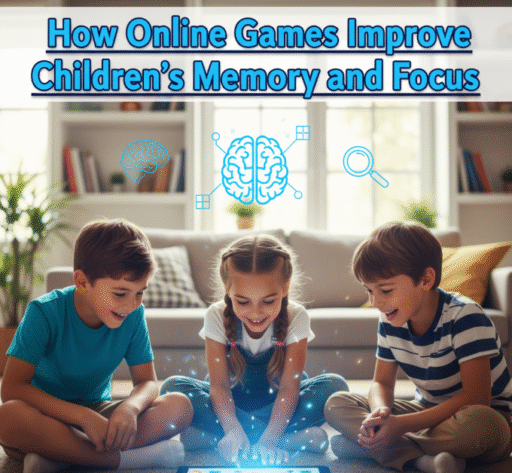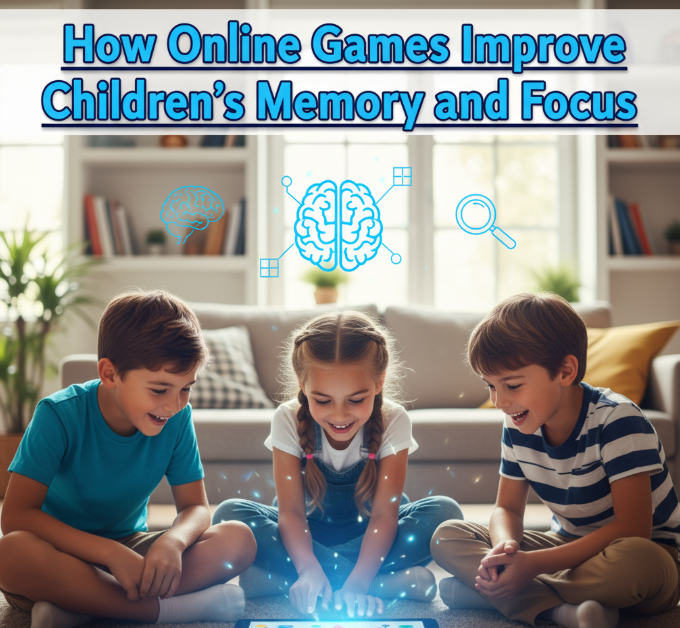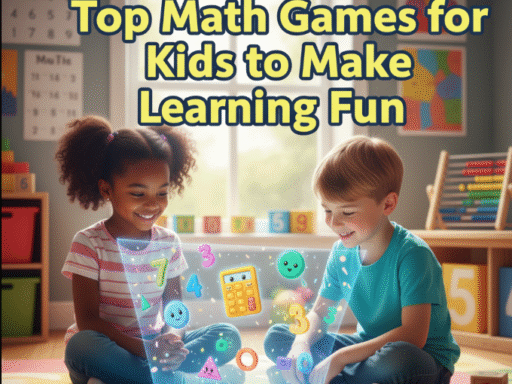Introduction
For many parents, online games may seem like nothing more than a fun distraction. Kids spend hours on their phones, tablets, or computers playing these games, and adults often worry it’s a waste of time. But here’s the surprising truth: not all online gaming is bad. In fact, when played in moderation, online games can actually boost memory, sharpen focus, and strengthen mental skills in children.
Think about it. Most online games demand quick decisions, remembering patterns, solving puzzles, and paying close attention to details. These are exactly the skills kids need not only in school but also in real-life problem-solving. Let’s explore how online games can actually help children improve their memory and focus, and why they are more than just entertainment.
Why Memory and Focus Matter in Children’s Growth
Before diving into the benefits of online games, it’s important to know why memory and focus are so vital during childhood.
-
Memory allows children to store information, recall lessons, and connect new knowledge with old. Without strong memory, studying becomes difficult.
-
Focus helps children avoid distractions and stay engaged in tasks. A strong attention span leads to better performance in academics, sports, and daily activities.
Together, memory and focus form the foundation for learning, creativity, and problem-solving. Online games—if chosen carefully—can act as digital exercise for the brain, strengthening these key abilities.
How Online Games Train the Brain
1. Pattern Recognition and Recall
Many online games use repeating patterns—like the sequence of steps, colors, or levels—that players must remember to progress.
-
Puzzle games such as Candy Crush or Sudoku apps train children to spot sequences quickly.
-
Memory-based games like Simon Says or card-matching apps improve short-term and long-term recall.
Benefit: The more children practice recognizing and recalling patterns, the stronger their memory becomes.
2. Concentration and Attention Span
Games require kids to stay focused for long periods without losing track of their goals. For example:
-
Strategy games demand children plan ahead while paying close attention to small details.
-
Action games test their ability to concentrate on moving objects, sound cues, and sudden changes.
Benefit: Continuous focus in gaming transfers into academic learning, where kids need to read, write, and solve problems without distraction.
3. Quick Decision-Making
Most games push children to make instant choices. Should they move left, attack, or solve the puzzle another way?
-
Multiplayer online games test reaction speed and adaptability.
-
These fast decisions enhance brain processing speed, which also helps in exams and real-life problem-solving.
4. Problem-Solving Skills
From unlocking new levels to overcoming challenges, online games always present problems to solve.
-
Puzzle-solving builds logical thinking.
-
Adventure games encourage creative solutions.
Benefit: Kids learn that patience and trial-and-error can lead to success, which improves perseverance in schoolwork.
5. Memory Boost through Storytelling Games
Games with strong storylines require children to remember characters, plots, and rules.
-
Role-playing games (RPGs) often demand kids to track multiple events at once.
-
This sharpens both episodic memory (events and experiences) and working memory (holding information while using it).
Types of Online Games That Enhance Memory and Focus
| Game Type | Examples | Skills Improved |
|---|---|---|
| Puzzle & Logic Games | Sudoku, Candy Crush | Pattern recognition, short-term memory |
| Strategy Games | Chess apps, Clash of Clans | Focus, planning, decision-making |
| Memory Games | Simon Says, Memory Cards | Recall, attention to detail |
| Story-based RPGs | Minecraft, Pokémon | Long-term memory, problem-solving |
| Action & Reflex Games | Subway Surfers, Temple Run | Concentration, quick thinking |
Scientific Backing: What Research Says
Studies around the world highlight the positive impact of games on the brain:
-
University of California, Irvine found that 3D video games improved memory performance by 12% in young adults.
-
American Psychological Association reports that video games can improve sustained attention and visual processing.
-
Harvard research suggests puzzle-based games boost problem-solving and analytical skills in children.
This evidence shows that gaming, when balanced with other activities, is more than just play—it’s a mental workout.
Benefits Beyond Memory and Focus
1. Hand-Eye Coordination
Games that involve quick movements—like racing or shooting—strengthen the link between vision and motor skills.
2. Stress Relief
Playing games offers kids a fun escape, which lowers stress and improves overall emotional health.
3. Teamwork and Social Skills
Multiplayer games encourage collaboration, communication, and leadership.
4. Goal-Setting and Achievement
Every level cleared gives children a sense of accomplishment, teaching them patience and persistence.
Real-Life Examples: How Kids Benefit
-
Ali, 10 years old – Used to forget math formulas. After playing puzzle games daily for 20 minutes, his recall improved, and he started scoring better in class.
-
Sara, 12 years old – Had trouble focusing during reading. Story-driven games helped her follow narratives better, and she now enjoys reading books.
-
Ahmed, 9 years old – Learned problem-solving through Minecraft, where he built creative structures while remembering resource combinations.
Tips for Parents: How to Make Gaming Healthy
While online games have many benefits, balance is the key. Here are some tips for parents:
-
Set time limits: 30–60 minutes daily is enough for most kids.
-
Choose the right games: Focus on puzzles, memory, and strategy games instead of violent ones.
-
Play together: Make gaming a family activity for bonding.
-
Connect learning with gaming: Use educational games that match school subjects.
-
Monitor online activity: Ensure games are safe and age-appropriate.
Potential Downsides if Not Controlled
It’s important to highlight that too much gaming can cause problems. Without balance, children may face:
-
Reduced physical activity leading to health issues
-
Eye strain from too much screen time
-
Addiction and difficulty in stopping gameplay
-
Ignoring schoolwork or real-life responsibilities
That’s why setting rules and balancing online games with outdoor play, study, and social interaction is crucial.
Infographic Idea (Description for Designers)
Title: “How Online Games Boost Memory and Focus in Kids”
-
Left side: Cartoon child playing a tablet
-
Right side: Brain with highlighted areas (memory, focus, problem-solving)
-
Arrows pointing to benefits like “Better Recall,” “Improved Concentration,” “Faster Decisions,” and “Creative Thinking.”

How Online Games Improve Children’s Memory and Focus
FAQs About Online Games and Children
Q1: Can online games really improve school performance?
Yes, by sharpening memory and focus, kids can perform better in subjects like math, science, and reading.
Q2: Are violent games harmful?
Excessive exposure to violent games can affect behavior negatively. Educational and puzzle-based games are better choices.
Q3: How long should kids play daily?
Experts suggest 30–60 minutes of focused play, combined with outdoor activities, is healthy.
Q4: Do all games improve memory and focus?
Not all. Strategy, puzzle, and memory-based games are best for mental growth.
Conclusion
Online games are no longer just about fun and entertainment—they’re a powerful tool for mental development. When chosen wisely and played in moderation, these games improve children’s memory, focus, problem-solving, and decision-making skills. Instead of seeing them as distractions, parents can use them as allies in their child’s learning journey.
The digital world is here to stay. By guiding kids toward the right games and balancing screen time with real-world activities, we can help them grow into sharper, more focused, and creative thinkers.




